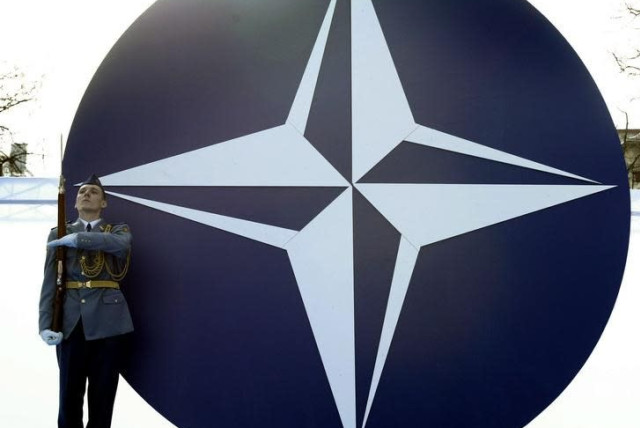Turkey strengthens NATO ties with participation in large-scale Neptune Strike military drills

The exercise comes as Poland declares its willingness to host NATO nuclear weapons, leading Russia to issue a threat.
Along with its NATO allies, Turkey is taking part in a large military exercise, practicing carrying out maritime strikes to defend soldiers in Eastern Europe. The exercise is taking place amid heightened tension over nuclear warfare.
The military alliance stated that the Neptune Strike 24-1 exercise will deter and showcase NATO’s capabilities for the “uncertain global stage.”
Turkey’s flagship naval carrier, the TCG Anadolu, is participating in a show of solidarity alongside Swedish jets patrolling the alliance’s airspace.
Ankara approved Sweden’s bid to join NATO in January after delaying a decision for over a year and a half. Sweden officially joined NATO in March.
The Reuters news agency reported that the Neptune drills would include long-range flights to simulate strikes in defense of militaries in Eastern Europe.
Aylin Ünver Noi, a professor of international relations at Istanbul’s Haliç University, told The Media Line that the military alliance needs to illustrate solidarity for its deterrence to work, especially in such “unpredictable” times.
“We don’t know how NATO’s deterrence [would] work to prevent Russia’s aggression or to change its behavior with regards to Ukraine,” she said.
Turkey faces multiple security threats in the region, including the war in Ukraine across the Black Sea in the north.
To the south, it borders Syria, Iraq, and Iran. Conflict and political repression in those three countries have brought millions to Turkey in search of refuge.
As a member of NATO, Turkey benefits from being allied with multiple nuclear powers and sharing in the collective defense principle, which states that countries will help a fellow member state if it is attacked.
'We're living in a very dangerous period'
“Turkey knows how important NATO [is] for its own security,” Ünver Noi said. “We’re living in a very dangerous period.”
In March, Turkey took part in a NATO drill led by Poland, which the alliance said was its largest military exercise since the Cold War.
The Neptune exercise, which started last Friday and will run until May 10, includes using a nuclear-powered French naval ship, which will be under NATO command for the first time.
In a press release about the Neptune exercise, NATO said it proves that the alliance “is able to face any threat from any direction faster, more persistently, and with more capable and stronger unity than ever before.”
The drills come amid heightened tensions with Russia after Poland, which borders Ukraine, said it is open to hosting nuclear weapons.
Russian Deputy Foreign Minister Sergey Ryabkov said that such nuclear facilities would be a target for his country, according to a report from the Russian state news agency TASS.
There have been signs that Ankara is improving relations with its Western allies since lifting its objections to Sweden entering NATO. The US agreed to sell Turkey F-16 fighter jets as a sign of the improving relationship.
On Monday, the Turkish state news agency reported that Ankara would support Dutch Prime Minister Mark Rutte’s candidacy for the NATO secretary general. That announcement followed a meeting between Rutte and Erdoğan in Turkey on Friday.
Yusuf Can, an analyst and coordinator for the Wilson Center’s Middle East program, told The Media Line that Turkey could potentially support Poland hosting nuclear weapons. However, it would be cautious because of the risk of escalating tensions with Russia.
Can said exercises such as Neptune allow Ankara to show itself as a committed NATO member, despite holding positions that have gone against many of the alliance’s policies.
Republican Senator Rick Scott, who represents Florida, said last October that NATO should reconsider keeping Turkey in the alliance because Turkey does not consider Hamas a terrorist organization.
Earlier this month, Erdoğan held a meeting in Istanbul with Hamas leader Ismail Haniyeh, which his office stated was about delivering aid to Gaza.
Taking part in the drills, Can said, gives other countries reason to vouch for Ankara’s role in NATO during complicated times such as these.
“Turkey having taken part in these drills helps its image in the alliance and the world,” he said.
It can be said that balancing the need for Western allies while maintaining a relationship with opponents of NATO has been Turkey’s modus operandi well before Erdogan took power.
“Turkey is in the middle of everything compared to the other NATO members,” Can said. “Turkey has a war on its north and south and all over its borders. That’s one of the main reasons Turkey needs NATO—that comfort zone, that security guarantee.”
Jerusalem Post Store
`; document.getElementById("linkPremium").innerHTML = cont; var divWithLink = document.getElementById("premium-link"); if (divWithLink !== null && divWithLink !== 'undefined') { divWithLink.style.border = "solid 1px #cb0f3e"; divWithLink.style.textAlign = "center"; divWithLink.style.marginBottom = "15px"; divWithLink.style.marginTop = "15px"; divWithLink.style.width = "100%"; divWithLink.style.backgroundColor = "#122952"; divWithLink.style.color = "#ffffff"; divWithLink.style.lineHeight = "1.5"; } } (function (v, i) { });

